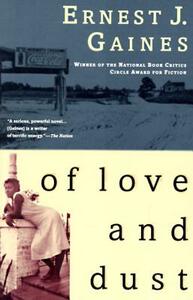You need to sign in or sign up before continuing.
Take a photo of a barcode or cover
Of Love and Dust represents "early Gaines." One of his first published works, the novel contains the beginnings of what would become cornerstones of all his novels. There is the fictional town of Bayonne, the black community on the sharecropping plantation, the ubiquitous wise protagonist tasked with watching over a young black man who is struggling in some way. All aspects of Gaines' novels that his readers tend to enjoy, but in Of Love and Dust, the concepts are immature. I won't say "underdeveloped" because it's more like he was learning to get on his feet with them. The result? In comparison to his later works, where these elements make the events that happen in the novel seem cozy and consequently eerily plausible, in this novel they don't quite attain that level of plausibility.
In this novel, Gaines is also still toeing the water when it comes to dialogue, which, in his later novels, is far and away the best aspect of his craft.
Overall, everything you love about Gaines is here, although some elements are somewhat immature. In typical fashion, his plots are not that strong, but I doubt any lovers of his novels are reading this book primarily for its plot.
In this novel, Gaines is also still toeing the water when it comes to dialogue, which, in his later novels, is far and away the best aspect of his craft.
Overall, everything you love about Gaines is here, although some elements are somewhat immature. In typical fashion, his plots are not that strong, but I doubt any lovers of his novels are reading this book primarily for its plot.
Like watching a train wreck: You know what is probably going to happen at the end and you just can't look away. A fast read and a well-told story.
Slow burn on the story as you pretty much know what’s coming, but it’s very believable and well-told.
Gaines’ writing is so potent that I was there in the Bayou—I smelled the dust and sweat. I felt the heat, wilting and oppressive. I smelled the food and the corn in the fields. I sensed the crackling tension and fear, the overwhelming unfairness and impotence. Slavery on the plantation leaves a heavy shadow and loud echoes in the quarters. Gaines is masterful.
Ratings:
Writing 4
Story line 3.5
Characters 3.5
Emotional impact 3
Overall rating 3.5
Writing 4
Story line 3.5
Characters 3.5
Emotional impact 3
Overall rating 3.5
It's hard to say much about this except it's super depressing. Set in post-WWII Louisiana, African Americans struggle to survive in the world of Jim Crow. The whole thing seemed futile (which is likely very accurate), and that made me immensely sad as I read it.

